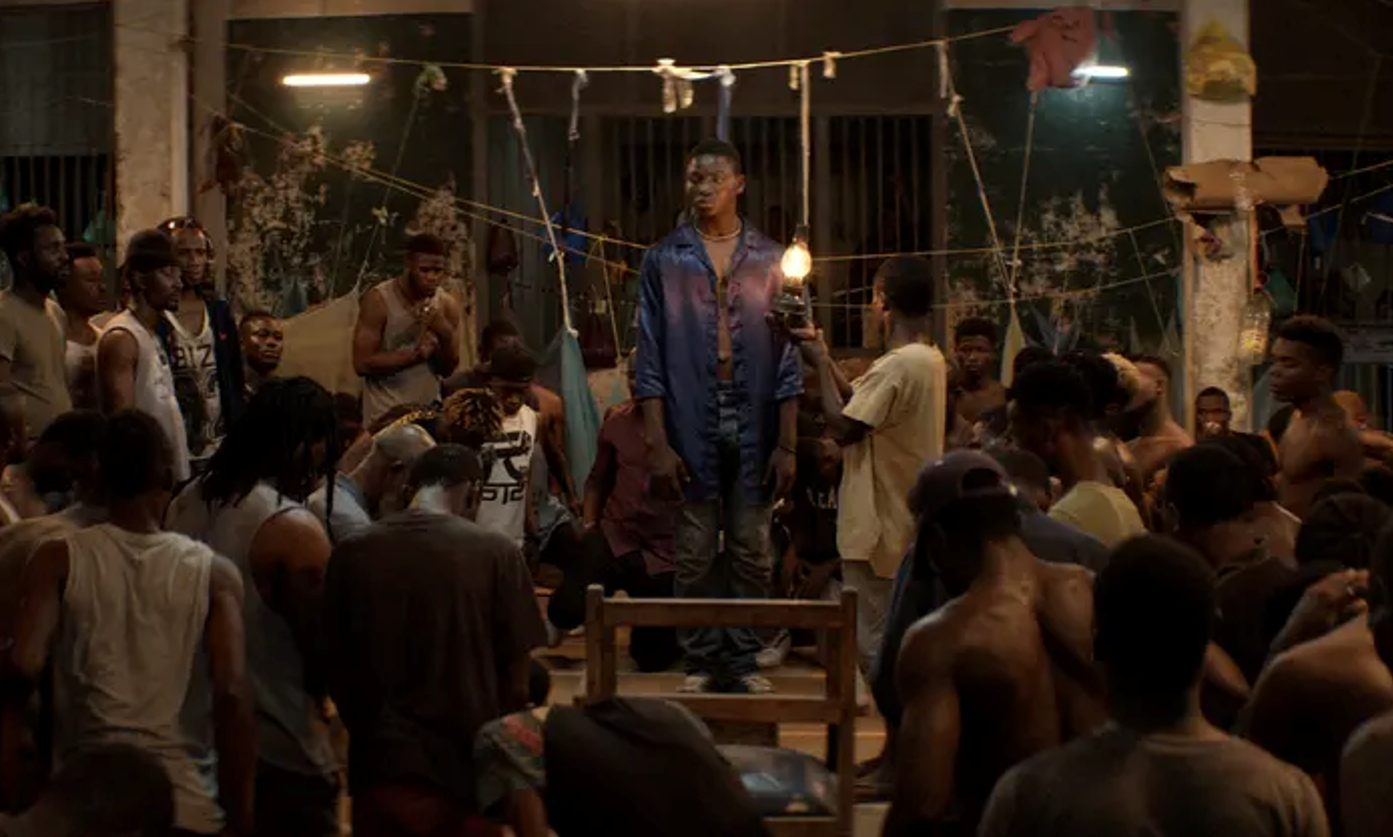
A new arrival to an Ivory Coast prison is unaware that his storytelling skills will determine his life or death.
| Reviewed by: Elisabeth Fong
All the world’s a stage, and all the men and women merely players. They have their exits and their entrances; and one man in his time plays many parts. A friend of a gang leader in one, and a charismatic storyteller in the next.
In an orchestrated act, the ailing king of the prison hanging on to his legacy, Blackbeard (Steve Tientcheu), bestows a new inmate as ‘Roman’ (Bakary Koné), the prison storyteller, in a Scheherazade-esque tale. Philippe Lacôte’s Night of the Kings is as captivating and suspenseful as it is theatrical and fantastical.
There is a liveliness in Lacôte’s Night of the Kings that is infectious; a certain pent-up energy from too many bodies confined in a tight space. This is a result of the film’s setting in La MACA (‘Maison d’Arrêt et de Correction d’Abidjan’), a notorious, secluded and overcrowded prison in Ivory Coast’s Banco National Park that holds some of Ivory Coast’s political detainees and violent offenders. Secluded in a forest, La Maca’s occupants are left ‘out of sight, out of mind’, and develop their own warring factions, hierarchies and customs.
As a child, director Philippe Lacôte would visit his mother, a political prisoner, in La MACA, and observe how prisoners speak to each other and with guards, noticing how it felt like a kingdom with kings, princes, and valets. Lacôte used actors who were ex-prisoners and imbued their dialogue with the slang of young people to mimic the age demographic in La MACA. “Reality comes from how the prisoners speak, how they walk; it’s the atmosphere of the prison that was most important for me. If you have this, you have the truth of the place.”
Backed into a corner against a bloodthirsty and harsh crowd, Roman decides to tell the story of the infamous Zama King, based on a real-life gang leader who died under similar circumstances. The tale jumps forward, backward, and the line between reality and magic is blurred.
The story is told primarily through Roman, but also through the audience, in a call-and-answer fashion, with dance and song breaks, and even a food break. These dance and song breaks are reminiscent of a stage play, with fluid, precise and energetic movements depicting street fights and magical duels. They seem to fly over each other, using their bodies as one as they lift each other up, literally. There’s a collaboration with the audience in this story that Roman is telling – it’s graceful, melodic, even beautiful. Lacôte said he “wanted the story turning inside prisoners and transforming them”, and truly, it’s a visceral experience. The atmosphere is trance-like, holding its intensity, and it’s where the film truly shines. For as long as Roman tells the tale, it is not just his story, but all of La Maca’s.
All the while, a power struggle between prison gangs plays out off stage, raising the stakes in the story in parallel with Zama King’s tale. Each time, the film lost its focus when it wandered away from Roman and La MACA. I was expecting a dramatic twist or a clever last-minute ploy by Blackbeard that brings the entire movie together. Instead, the story is left much to the imagination in an anti-climatic final act.
In the middle of this tight circle, a boy with a story and a powerful imagination enabled us to travel time, distance and suspend the realities of life, even momentarily. That is the power of a good story, and Night of the Kings is a powerful celebration of the oral traditions and rituals we participate in to make life bearable.
NIGHT OF THE KINGS was screened by The Projector in July 2022. _ Elisabeth Fong When not reading letterboxd’ reviews or watching fan-made videos, Elisabeth talks about movies and tv shows on her podcast Critical Cliches. |
Click Here For More Film Reviews
Do you love writing? Send us a film review and we will feature it on our website. Any film that people can see in the theater or online. Email to: media@scape.sg
This review is also published on Singapore Film Society as part of *SCAPE’s Film Critics Lab: A Writing Mentorship Programme.


